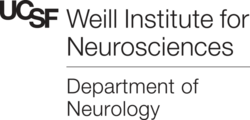About
Program Description
The UCSF Movement Disorders Fellowship is a 24-month fellowship that provides clinical and research training across a wide range of areas. The fellowship involves two sites: the UCSF Weill Institute for Neurosciences and the Parkinson’s Disease Research, Education, and Clinical Center (PADRECC) at the San Francisco Veterans Affairs Medical Center. Both sites provide a broad array of clinical experience, cutting edge research opportunities, and comprehensive didactics. Fellows gain hands on experience with advanced therapies for Parkinson’s disease and other movement disorders including botulinum toxin injections and deep brain stimulation (DBS). UCSF has been designated as a Parkinson Foundation Center of Excellence, a Parkinson Study Group site, a National Ataxia Foundation Center of Excellence, and a Huntington's Disease Center of Excellence. This recognition indicates an environment rich with clinical and research expertise, ongoing trials, and networking opportunities that ensure a strong foundation for a career in Movement Disorders.
Mission
We aim to train the next generation of leaders in academic movement disorders. Along with providing expert clinical care and innovative research training, we view education as central to our mission of advancing the understanding and treatment of Parkinson’s disease (PD) and other movement disorders. A spirit of collaboration is key to achieving these objectives and gives fellows highly integrated, comprehensive, extraordinarily rich and varied training. From its inception, our program has benefited from partnerships with the San Francisco VA Parkinson’s Disease and Research Education and Clinical Center (PADRECC) and our internationally recognized integrated DBS/neurophysiology program (led by Dr. Jill Ostrem and Dr. Philip Starr). Dr. Caroline Tanner and others have built a leading research program in PD epidemiology and clinical trials. Our strong collaborations expand across UCSF including the Memory and Aging Center, the Neuroimmunology and Glial Biology division, and the Neurorecovery Clinic.
Clinical Experience
Our fellows are immersed in comprehensive clinical experiences at multiple sites, working with national leaders in the field. Multidisciplinary collaboration with neurosurgery, behavioral neurology, psychiatry, neuropsychology, and physical therapy is central. The fellows are involved in the entire course of disease management, from early detection and diagnosis through advanced therapeutic options through palliative care. Working in one of most experienced Deep Brain Stimulation (DBS) centers in the world, fellows gain expertise in all aspects of DBS management; from pre-operative candidacy evaluation, to intraoperative physiology, to the use of interventional-MRI (iMRI) technique of implanting DBS electrodes, to post-operative programming. Fellows get hands-on experience in our dystonia center’s botulinum toxin injection clinic, utilizing EMG and ultrasound guidance. Movement Disorders fellows develop additional independence by managing their own patients longitudinally for two years in supervised weekly continuity clinics at the San Francisco VA PADRECC.
Research Opportunities
Fellows are expected to substantially participate in research or other scholarly activities and have protected time, especially during the second year. Faculty have a broad range of clinical and basic science research interests and welcome fellow assistance with research studies. Our close ties with other departments, including the Memory and Aging Center and Gladstone Institute, allows for interdisciplinary work and opportunities to build on prior collaborations. Fellows frequently have the opportunity to participate in sponsored clinical trials, learning valuable skills that can be integrated into practice. Fellows are encouraged to present their own research at professional conferences and are assisted in attendance if their work is accepted. We involve fellows in cutting-edge science to have a relevant, impactful foundation from which to build a career.
Education and Mentorship
Mentorship and career development is an important part of training in our fellowship. Each fellow meets with the program directors several times a year to receive feedback and discuss clinical and research work. Research mentors meet monthly with fellows. Also, each fellow is assigned a “near-peer” junior faculty mentor at the beginning of the fellowship.
Fellows attend and present at monthly video rounds and weekly education conference which includes lectures on rare disorders, neuropathology, neuropsychology, and recent scientific advances. Fellows attend and present at regularly scheduled journal clubs at both UCSF and the San Francisco VA PADRECC. Fellows are also able to individualize their training through several coursework opportunities including biostatistics, research design, and health professional education courses. Our program also supports fellows to attend the Aspen Movement Disorders course and the annual Movement Disorder Society International Congress.
How to Apply
Prerequisites
Information to Provide
Application Process
Applicant Dates
Contact Us
Ethan Brown, M.D.
Program Director
Associate Professor of Clinical Neurology
[email protected]
415-353-2311
Rafael Zuzuarregui, M.D.
Program Director
Associate Professor of Neurology
Director, San Francisco VA Parkinson’s Disease and Research Education and Clinical Center
[email protected]
415-353-231
Sabrina Ho
Program Coordinator
[email protected]
Current Fellows
2025, Diksha Mohanty, MD, University of Louisville
2025, Victoria Chang, MD, University of Washington
2025, Pamela Marcott, MD, PhD, University of California San Francisco
2025, Phuong Hoang, MD, PhD, University of California San Francisco
2026, Tara Torabi, MD, Stanford University
2026, Nicole Pulley, MD, Johns Hopkins Medicine
Beginning Fellowship July 2024
2027, Zainab Zulali, MD, University of California San Francisco
2027, Karen Ibarra, MD, University of California San Francisco
